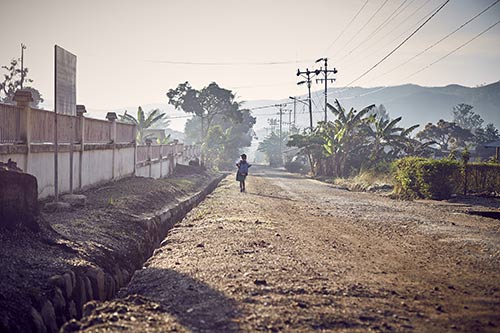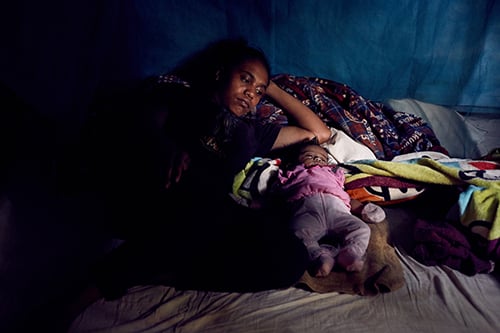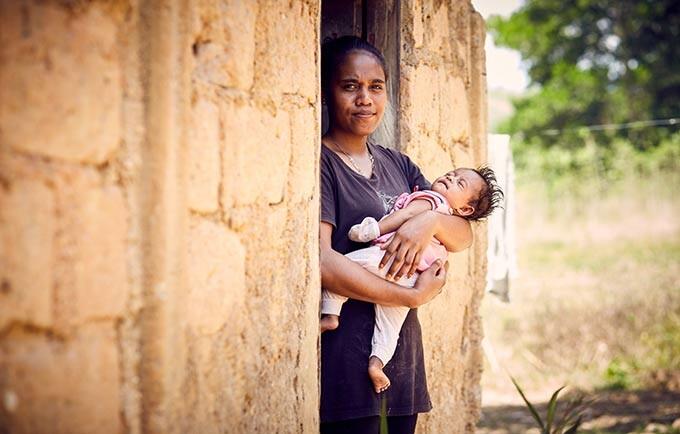AILEU, Timor-Leste – “I knew a little bit about how a baby is made, but not too much,” said Natalia, 19, in the Aileu district in the rocky highlands of Timor-Leste. Her 1-year-old daughter, Afeena, was sleeping nearby. “I had no education about this at school. No lessons at all related to this topic. Nothing.”
Natalia’s life began to unravel after she became pregnant. Her boyfriend abandoned her.
“I dropped out of school and never went to see a doctor or had any consultation,” she explained. “I even managed to hide it from my family. When I went into labour, I told my father I had back pain, but he soon discovered I was having a baby.”
Natalia was rushed to a local clinic. She was terrified for her life; her mother had died during the birth of a younger sibling.
Fortunately, Afeena was delivered safely.
Still, there is plenty to worry about. Natalia will most likely have to raise her daughter alone.

Deck stacked against girls
Early pregnancy is a major concern in Timor-Leste. And almost one quarter of women in the country have a baby by the time they are 20. Early pregnancies are often swiftly followed by marriages; 19 per cent of girls are married by the time they are 18.
Deeply entrenched gender inequalities – including high rates of violence against women and barriers to reproductive health care – play a role in these grim figures.
“We currently have an intimate partner violence rate of around 60 per cent in Timor-Leste,” said Candie Cassabalian, a UNFPA youth specialist.
And because of restrictive social norms, contraception is often accessible only with a husband's consent. “Married women, no matter their age, have very little control over their own body and their own fertility, so very quickly young women end up with multiple children, limited opportunities and even less choice,” Ms. Cassabalian said.
Contributing to this problem is the limited availability of comprehensive sexuality education.
“Even though some sexuality education curriculum is there in schools, often the teacher is not confident to deliver the information, and it is not something they feel comfortable to talk about,” said Lala Soares, a gender expert with Plan International in Timor-Leste.
“They tell me when they get to this topic, they rip the pages of the textbook out,” she added.

Violence, motherhood and a child marriage
Lucia*, now 18, faced all of these issues.
As a teenager, she became involved with her teacher, a much older man.
“When my parents found out I had a boyfriend, they were very angry. They told me they wanted to beat me to death,” she said, sharing her story at a girls’ empowerment workshop held by Plan International, a close partner of UNFPA.
Her family beat her so viciously she ended up in the hospital. Still, she and her boyfriend remained together, and Lucia became pregnant.
“I didn’t know you could get pregnant from having sex,” she said.
The families hastily arranged a marriage between Lucia and her teacher.
Such efforts are designed to preserve a family’s honour – but they do little to protect the girls affected. Child marriage actually increases girls’ vulnerability. Pregnancy and marriage also keep young mothers from returning to school.
“The perception is that school is only a place for children and children don’t have sex – or even romantic involvement. So even if the girl is married off quickly, she would not normally be allowed to re-enter school,” explained Ms. Cassabalian.
More must be done
UNFPA is working with the government and partners to better understand the issues surrounding teen pregnancy. UNFPA, together with Plan International and the government’s Secretariat of State for Youth and Sports, recently released a report about these issues, which could help policymakers better address them.
UNFPA also advocates for young people’s right to sexual and reproductive health and information. For example, UNFPA is helping to assess and develop comprehensive sexuality education curricula and trainings, and is supporting efforts to make health services more youth-friendly.
In one positive move, the government recently approved an education policy that promotes the rights of pregnant teens.
But more must be done.
“As a country, we need to pay attention to the issue of equity, and we need gender equality if we want to have a good future,” Ms. Soares said.
– Ruth Carr
* Name has been changed to protect privacy


